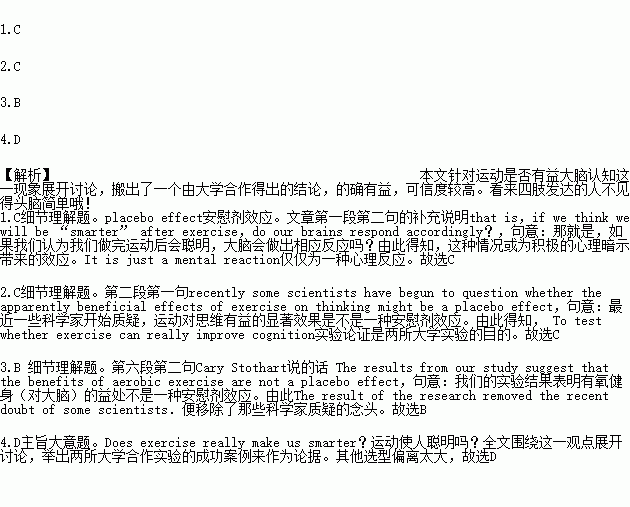题目内容
Exercise seems to be good for the human brain,with many recent studies suggesting that regular exercise improves memory and thinking skills.But an interesting new study asks whether the apparent cognitive benefits from exercise are real or just a placebo effect — that is,if we think we will be “smarter” after exercise,do our brains respond accordingly?The answer has significant implications for any of us hoping to use exercise to keep our minds sharp throughout our lives.
While many studies suggest that exercise may have cognitive benefits,recently some scientists have begun to question whether the apparently beneficial effects of exercise on thinking might be a placebo effect.So researchers at Florida State University in Tallahassee and the University of Illinois at Urbana-Champaign decided to focus on expectations,on what people anticipate that exercise will do for thinking.If people’s expectations jibe (吻合) closely with the actual benefits,then at least some of those improvements are probably a result of the placebo effect and not of exercise.
For the new study,which was published last month in PLOS One,the researchers recruited 171 people through an online survey system,they asked half of these volunteers to estimate by how much a stretching and toning regimens (拉伸运动) performed three times a week might improve various measures of thinking.The other volunteers were asked the same questions,but about a regular walking program.
In actual experiments,stretching and toning program generally have little if any impact on people’s cognitive skills.Walking,on the other hand,seems to substantially improve thinking ability.
But the survey respondents believed the opposite,estimating that the stretching and toning program would be more beneficial for the mind than walking.The estimates of benefits from walking were lower.
These data,while they do not involve any actual exercise,are good news for people who do exercise.“The results from our study suggest that the benefits of aerobic exercise are not a placebo effect,” said Cary Stothart,a graduate student in cognitive psychology at Florida State University,who led the study.
If expectations had been driving the improvements in cognition seen in studies after exercise,Mr.Stothart said,then people should have expected walking to be more beneficial for thinking than stretching.They didn’t,implying that the changes in the brain and thinking after exercise are physiologically genuine.
The findings are strong enough to suggest that exercise really does change the brain and may,in the process,improve thinking,Mr.Stothart said. That conclusion should encourage scientists to look even more closely into how,at a molecular level,exercise remodels the human brain,he said. It also should encourage the rest of us to move,since the benefits are,it seems,not imaginary,even if they are in our head.
1.Which of the following about the placebo effect is TRUE according to the passage?
A. It occurs during exercise.
B. It has cognitive benefits.
C. It is just a mental reaction.
D. It is a physiological response.
2.Why did the researchers at the two universities conduct the research?
A. To discover the placebo effect in the exercise.
B. To prove the previous studies have a big drawback.
C. To test whether exercise can really improve cognition.
D. To encourage more scientists to get involved in the research.
3.What can we know about the research Cary Stothart and his team carried out?
A. They employed 171 people to take part in the actual exercise.
B. The result of the research removed the recent doubt of some scientists.
C. The participants thought walking had a greater impact on thinking ability.
D. Their conclusion drives scientists to do research on the placebo effect.
4.What might be the best title for the passage?
A. Is it necessary for us to take exercise?
B. How should people exercise properly?
C. What makes us smarter during exercise?
D. Does exercise really make us smarter?
 天天向上一本好卷系列答案
天天向上一本好卷系列答案 小学生10分钟应用题系列答案
小学生10分钟应用题系列答案

